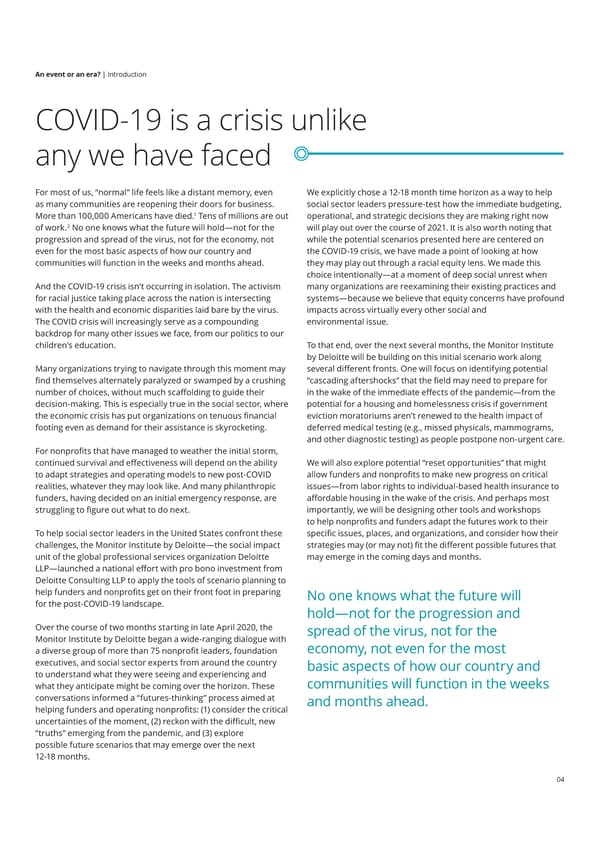An event or an era? | Introduction COVID-19 is a crisis unlike any we have faced For most of us, “normal” life feels like a distant memory, even We explicitly chose a 12-18 month time horizon as a way to help as many communities are reopening their doors for business. social sector leaders pressure-test how the immediate budgeting, 1 More than 100,000 Americans have died. Tens of millions are out operational, and strategic decisions they are making right now 2 of work. No one knows what the future will hold—not for the will play out over the course of 2021. It is also worth noting that progression and spread of the virus, not for the economy, not while the potential scenarios presented here are centered on even for the most basic aspects of how our country and the COVID-19 crisis, we have made a point of looking at how communities will function in the weeks and months ahead. they may play out through a racial equity lens. We made this choice intentionally—at a moment of deep social unrest when And the COVID-19 crisis isn’t occurring in isolation. The activism many organizations are reexamining their existing practices and for racial justice taking place across the nation is intersecting systems—because we believe that equity concerns have profound with the health and economic disparities laid bare by the virus. impacts across virtually every other social and The COVID crisis will increasingly serve as a compounding environmental issue. backdrop for many other issues we face, from our politics to our children’s education. To that end, over the next several months, the Monitor Institute by Deloitte will be building on this initial scenario work along Many organizations trying to navigate through this moment may several different fronts. One will focus on identifying potential find themselves alternately paralyzed or swamped by a crushing “cascading aftershocks” that the field may need to prepare for number of choices, without much scaffolding to guide their in the wake of the immediate effects of the pandemic—from the decision-making. This is especially true in the social sector, where potential for a housing and homelessness crisis if government the economic crisis has put organizations on tenuous financial eviction moratoriums aren’t renewed to the health impact of footing even as demand for their assistance is skyrocketing. deferred medical testing (e.g., missed physicals, mammograms, and other diagnostic testing) as people postpone non-urgent care. For nonprofits that have managed to weather the initial storm, continued survival and effectiveness will depend on the ability We will also explore potential “reset opportunities” that might to adapt strategies and operating models to new post-COVID allow funders and nonprofits to make new progress on critical realities, whatever they may look like. And many philanthropic issues—from labor rights to individual-based health insurance to funders, having decided on an initial emergency response, are affordable housing in the wake of the crisis. And perhaps most struggling to figure out what to do next. importantly, we will be designing other tools and workshops to help nonprofits and funders adapt the futures work to their To help social sector leaders in the United States confront these specific issues, places, and organizations, and consider how their challenges, the Monitor Institute by Deloitte—the social impact strategies may (or may not) fit the different possible futures that unit of the global professional services organization Deloitte may emerge in the coming days and months. LLP—launched a national effort with pro bono investment from Deloitte Consulting LLP to apply the tools of scenario planning to help funders and nonprofits get on their front foot in preparing No one knows what the future will for the post-COVID-19 landscape. hold—not for the progression and Over the course of two months starting in late April 2020, the spread of the virus, not for the Monitor Institute by Deloitte began a wide-ranging dialogue with economy, not even for the most a diverse group of more than 75 nonprofit leaders, foundation executives, and social sector experts from around the country basic aspects of how our country and to understand what they were seeing and experiencing and communities will function in the weeks what they anticipate might be coming over the horizon. These conversations informed a “futures-thinking” process aimed at and months ahead. helping funders and operating nonprofits: (1) consider the critical uncertainties of the moment, (2) reckon with the difficult, new “truths” emerging from the pandemic, and (3) explore possible future scenarios that may emerge over the next 12-18 months. 04
 US Deloitte Monitor Institute Page 3 Page 5
US Deloitte Monitor Institute Page 3 Page 5